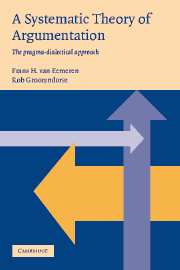3 - A model of a critical discussion
Published online by Cambridge University Press: 12 January 2010
Summary
Classical roots of argumentation studies
Like research in many other disciplines, the study of argumentation goes back to classical antiquity. Unlike in most other disciplines, however, knowledge of the ancient literature remains in argumentation theory a necessary condition for a proper exercise of the profession. Certain theoretical insights formulated by classical authors, such as Aristotle and Cicero, still belong to the core of argumentation theory. They are an integral part of the foundations of the hermeneutic and critical tools that are currently available for the analysis and evaluation of argumentative discourse and texts.
After the Sophists had for a long time taught all kinds of argumentative skills, the theoretical interest in argumentation crystallized in Greek antiquity in syllogistic logic (which was then called analytica), dialectic (dialectica), and rhetoric (rhetorica). For Aristotle, logic was concerned with analytical arguments in which the truth of the premises is evident. Dialectic represented the art of regulated debate, and was treated in the Topica (Topics) and De sophisticis elenchis (On Sophistical Refutations). Rhetoric, the art of persuading an audience, is discussed by Aristotle in the Rhetorica (On Rhetoric).
In his logic, Aristotle distinguishes between two kinds of arguments: deductive syllogisms and inductive syllogisms. Both kinds of syllogisms are also used in dialectical arguments, but the premises of the argument are in dialectic always statements that are not evidently true but are generally accepted – as Aristotle says, statements that are acceptable to “the wise or at least the majority of them.
Information
- Type
- Chapter
- Information
- A Systematic Theory of ArgumentationThe pragma-dialectical approach, pp. 42 - 68Publisher: Cambridge University PressPrint publication year: 2003
